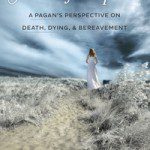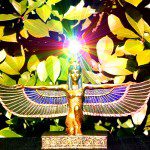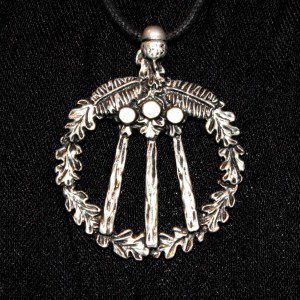 Over the past few weeks I’ve had multiple people ask me to tell them about OBOD: the Order of Bards, Ovates and Druids. Most are considering joining the Order and just as I did before I signed up, they want to pick the brain of someone who’s been there and done that. I’ve answered the individual questions, but there are probably others… which means it’s time to blog about it.
Over the past few weeks I’ve had multiple people ask me to tell them about OBOD: the Order of Bards, Ovates and Druids. Most are considering joining the Order and just as I did before I signed up, they want to pick the brain of someone who’s been there and done that. I’ve answered the individual questions, but there are probably others… which means it’s time to blog about it.
Like many people, I came into Paganism through Wicca. I wanted to be a Witch and I tried to be a Wiccan but it just wasn’t a good fit for me. But when I first read about Druidry, something clicked. This wasn’t something that looked interesting and cool – this was who I am. I didn’t choose Druidry, Druidry chose me.
Unfortunately, there were no Druid groves anywhere near me. When I realized I needed a group, I went to check out Denton CUUPS, and that was a good fit. Before long I found myself in a leadership role… a role I didn’t feel qualified to fill.
I knew I needed some training and I wanted training in Druidry. After some investigation and reflection, I signed up for the Bardic course of the Order of Bards, Ovates and Druids. I completed the Bardic course in 15 months, the Ovate course in 25 months, and the Druid course in 24 months. My certificate proclaiming me “a full member in the Druid grade” hangs on the same wall with my high school, college, and graduate diplomas.
That’s the “what” – it’s a story I’ve told many times. But the question of “why” remains – why do I still identify as an OBOD Druid when my current practice is focused on devotional polytheism?
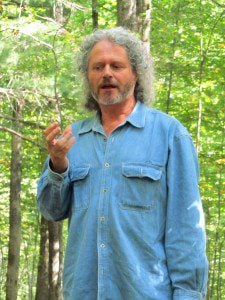
OBOD has an excellent distance learning program. There’s nothing quite like learning at the feet of an experienced, knowledgeable elder, and there are some traditions that teach no other way. The problem is finding an experienced, knowledgeable elder who isn’t already teaching more students than she can handle. Other traditions have distance learning and individual study programs and some of them are good – and in the end, no matter what kind of training program you follow, you have to do the work.
OBOD’s program is simply the best I’ve seen. Historian Ronald Hutton has said the OBOD course “arguably represents one of the major documents of British spirituality from the late twentieth century.” Practiced diligently, it can enable a motivated student to grow from knowing virtually nothing to becoming a competent Druid practitioner in a few years.
The downside of the OBOD program is the cost. The current price of the Bardic course is £215, which is $348 at today’s exchange rates. The other courses are similarly priced. Keep in mind this doesn’t just represent the cost of the lesson booklets – it’s how the Order supports itself. There are no other membership fees. It sounds like a lot, but how much do you spend on cable TV? When people balk at the cost, I have one recommendation: if the cost represents a hardship, don’t do it. If the cost represents a sacrifice, do.
OBOD provides a grounding in historical Druidry. What we know about the original Druids is inspirational, but there simply aren’t enough facts to build a practice around it. But history doesn’t jump from the Anglesey massacre in 61 CE to Ross Nichols and Isaac Bonewits in the second half of the 20th century. Druids never really left the collective imagination of the British Isles and while the 1717 date Nichols claimed for the founding of the order that would lead to OBOD is likely more mythical than historical, it is certain there were Druid orders operating in the 18th century.
These Revival Druids were not Pagans. But they laid the foundations for today’s mostly-Pagan Druidry, and they contributed non-orthodox ideas to the Christian culture – ideas that would influence the early modern Pagan movement. The Revival Druids are our spiritual ancestors. They deserve our respect and their ideas deserve our consideration.
OBOD provides a foundation and a framework for Pagan practice. Although OBOD is a non-creedal and non-doctrinal order, most of its material is presented in a Pagan context. It has roots in the Western Mystery Tradition: OBOD ritual casts circles, calls directions, and works with the four (or five) elements. It works with Gods and Goddesses, honors sacred sites, and emphasizes the sacredness of Nature. It celebrates the Wheel of the Year.
OBOD founder Ross Nichols was a friend and sometimes editor of Gerald Gardner, founder of Wicca. There is a story (that may or may not be true) that says Gardner originally wanted to celebrate the four solar holidays and Nichols wanted to celebrate the four Celtic fire festivals. They combined the two to create the modern Pagan calendar.
I found much that was familiar when I worked through the early Gwersi (lesson booklets), but I don’t think there was a single one where I didn’t learn something new. I wanted training to help lead a Pagan group and I found what I wanted.
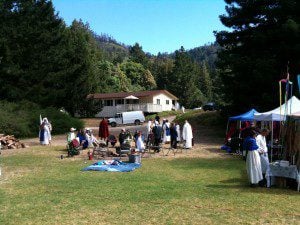
OBOD provides connections and community. It is possible to move through the three grades and never interact with another Druid beyond your assigned mentors, who monitor progress and answer questions (of a factual nature – requests for interpretation are usually answered with “what do you think?”). Many OBOD members do exactly this.
But despite the lack of a local grove, I’ve made many personal connections at OBOD camps and through social media. More than a few of these connections have become deep friendships. I’ve also met Druids from other orders at OBOD events and through OBOD connections.
The training and education brought me into OBOD. The friendships I’ve made within the Order keep me active in OBOD.
Spiritual depth. It is possible to spend a lifetime studying the lessons of the three grades, practicing the meditations, performing the rituals, and participating in this-world activities they inspire. I know some OBOD Druids who do this, and if that works for you I recommend it. There is great depth in the teachings of the Order.
But while this approach would be very Nature-centered and Self-centered, it wouldn’t be very Deity-centered. This is why, ultimately, OBOD isn’t enough for me. Polytheism is an essential part of my religious and spiritual life and while OBOD is compatible with polytheism, it doesn’t emphasize it. My interactions with the Gods and my relationships with Them require a level of devotion OBOD doesn’t teach.
That doesn’t mean there’s anything wrong with OBOD – it just means OBOD, by itself, isn’t enough for me. But the spiritual techniques it taught me have been very helpful in exercising that devotion.
There are many fine Druid orders and I have friends in several. Honestly, I don’t know any Druid orders I’d recommend you avoid. If I had unlimited time I’d probably join one or two more just to see what I could learn from them. There is no “best” Druid order, just different orders that fit individuals very well or not so well. If you feel called to Druidry, do some on-line investigation, read a few books, talk to some people who have first-hand experience, and make the best choice for you.
This is why I’m an OBOD Druid.


